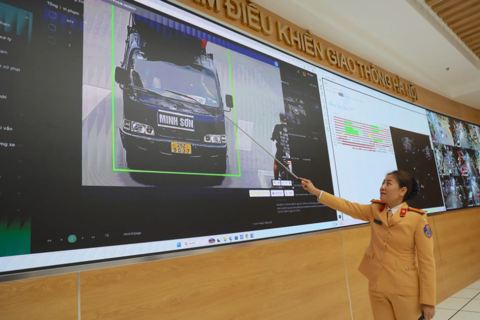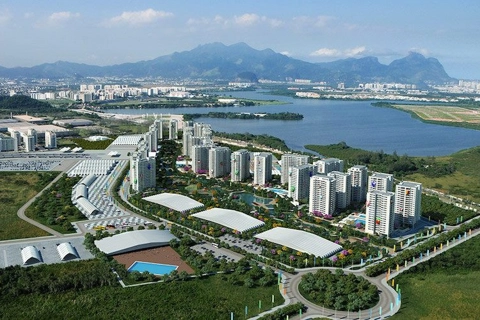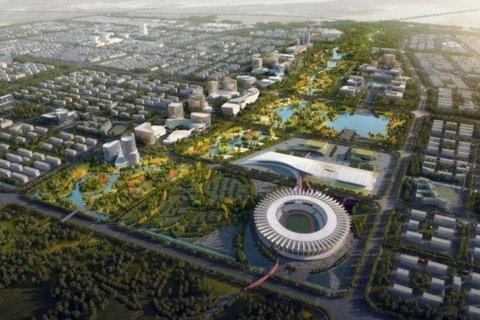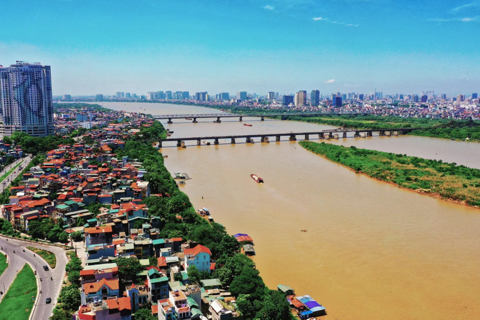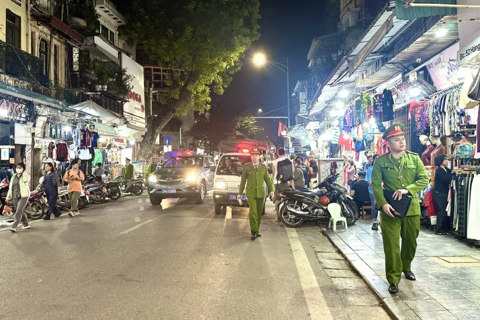Finding ways to develop Hanoi as halal-friendly destination
To boost halal tourism, it's necessary to build trust with the Muslim community, based on standard services and well-trained human resources.
THE HANOI TIMES — Hanoi is one of three cities (along with Ho Chi Minh City and Danang) selected by the Ministry of Foreign Affairs to pilot the promotion of halal products.
At an international conference on "Prospects for Developing Tourism Associated with Halal in Hanoi" held in Hanoi this week, experts believe that halal tourism can help add value to products catering to visitors from the Middle East and Muslim countries.
The workshop was attended by nearly 150 local and international delegates, including diplomats, experts, scholars, service providers, halal certification organizations, and representatives from the embassies of Azerbaijan, Pakistan, Iran, Palestine, and Turkey.
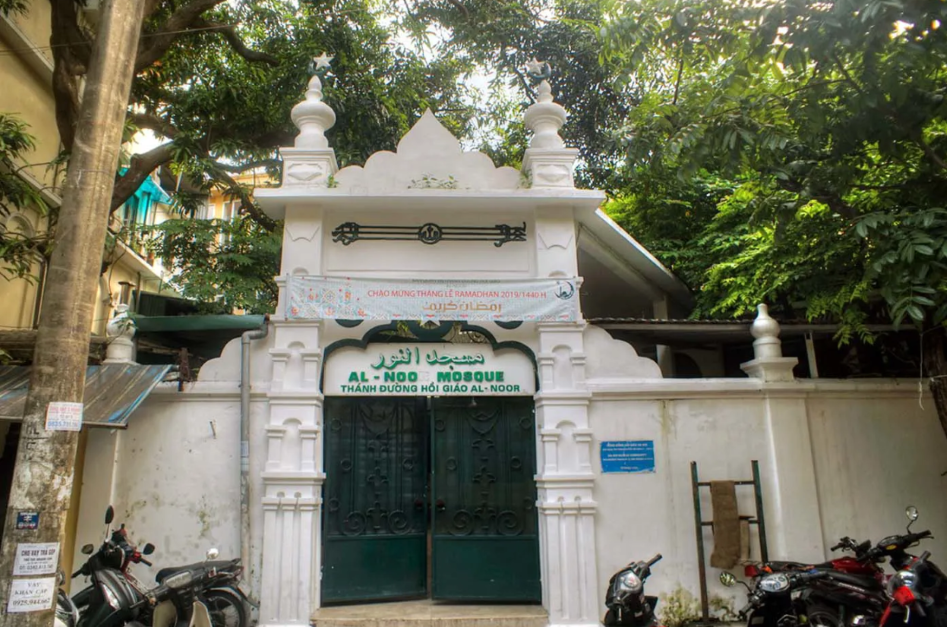
A mosque on Hang Luoc Street in Hanoi. Photo: Hoai Nam/The Hanoi Times
Potential market
In the context of the strong rise of the world's halal industry (halal food and beverages, halal pharmaceuticals, halal cosmetics, fashion and art, Islamic digital economy, health and healthcare, Muslim-friendly tourism...) with an estimated market size of up to US$3 trillion, Vietnam is gradually emerging as an important link in the global supply chain.
As the concept of halal has become an international standard for quality, safety, and ethics in production and services, Vietnam's halal tourism is gradually asserting its position on the regional map.
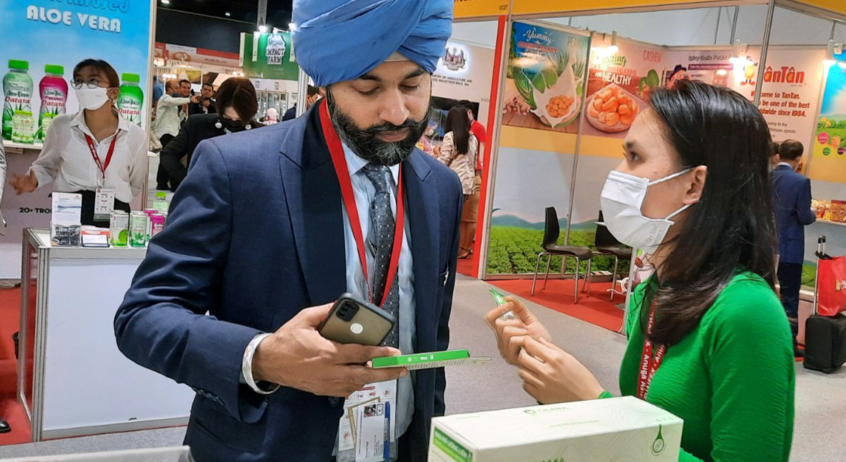
A Hanoi businesswoman presents a product to a Muslim partner. Photo: Hoai Nam/The Hanoi Times
According to Trinh Thi Thu Ha, Dean of Hanoi College of Commerce and Tourism, halal tourism is emerging as a global trend and is expected to contribute nearly $350 billion to the global tourism industry by 2030. With more than 1.9 billion Muslims worldwide, this is a potential market that Vietnam must proactively tap into.
Meanwhile, Ambassador of the Republic of Azerbaijan to Vietnam Shovgi Kamal Oglu Mehdizade assessed that Vietnam has great potential for the development of halal tourism, especially for Muslim countries, and is increasingly becoming an attractive destination for tourists from Pakistan, Azerbaijan, Kazakhstan, Turkey, and Arab countries.
"Most Muslim tourists, when they come here, look for halal-certified restaurants and halal services in hotels," said Ambassador Shovgi Mehdizade. He believed that in the future, the Embassy of Azerbaijan in Hanoi could connect travel agents, resorts, restaurants, and hotels in Vietnam with travel and tourism companies from Azerbaijan to be able to welcome more tourist groups from his country to Vietnam.
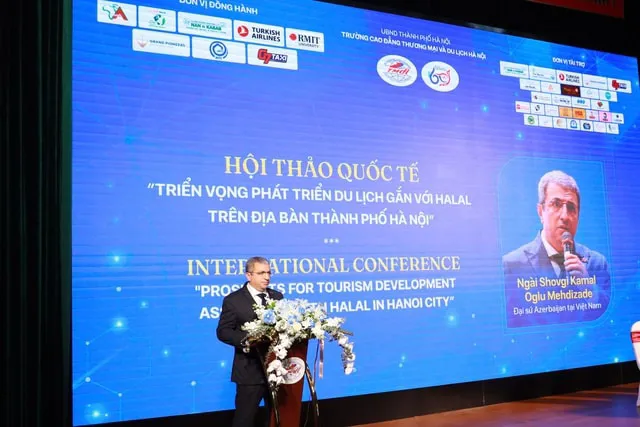
Ambassador of the Republic of Azerbaijan to Vietnam Shovgi Mehdizade talks about halal tourism at the international conference held in Hanoi on April 15. Photo: Courtesy of the Organizing Committee
Hanoi is a destination with many strengths in terms of landscape, cuisine, and tourism infrastructure, but still deficient in halal products and services. Therefore, how to make Hanoi a friendly destination for the Muslim community is the topic to be discussed.
Hanoi: A Muslim-friendly destination
At the conference, Director of the National Halal Certification Center, Ramlan Osman, shared information about the value of halal certification, full awareness of Muslim-friendly tourism, the necessary conditions to serve halal tourists, programs, training content, potential of Islamic tourism.
According to Ramlan Osman, to cater to the halal market, the tourism service industry needs to ensure halal-standard food, prayer facilities, Ramadan-related services, privacy in entertainment activities, and family-friendly travel packages, among others.
In particular, hotels must be truly Muslim-friendly by: "Ensuring all factors such as having at least one halal standard restaurant; prayer signs for Muslims on the ceiling; prayer rugs and the Quran; updated information on prayer times; a separate swimming pool/gym area; a buffet for breaking the fast during Ramadan; pre-dawn meals to prepare for fasting days; a separate prayer room, especially for MICE hotels; and someone in charge of halal inspection," said Ramlan Osman.
To become a Muslim-friendly destination, experts emphasize the role of training human resources with cultural understanding, increasing the competitiveness of destinations, and promoting sustainable international connections.
According to Trinh Thi Thu Ha, human resources and human training play a crucial role in the development of halal tourism.
"Regrettably, the lack of human resources is one of the reasons why the number of Muslim tourists to Vietnam is still quite modest, so tourism training institutions nationwide need to join hands to prepare manpower to meet the demand," Ha added.
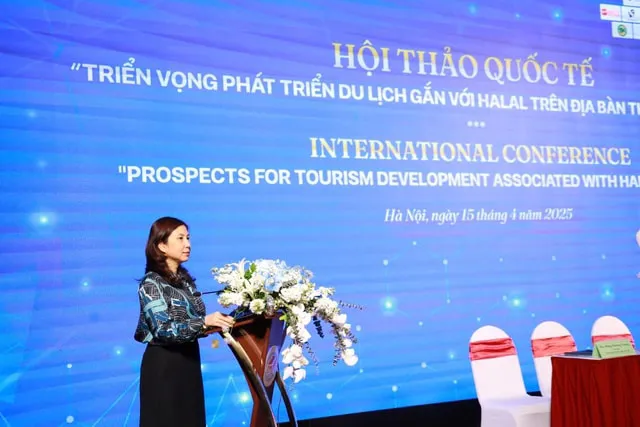
Dang Huong Giang, Director of the Hanoi Department of Tourism, shares Hanoi's plan to become a halal-friendly destination. Photo: Courtesy of the Organizing Board
Speaking at the conference, Director of the Hanoi Department of Tourism Dang Huong Giang said that there is still a lot of room to attract halal tourists to Hanoi. To seize this opportunity, the Hanoi Tourism Department will strengthen the promotion plan and raise awareness among tourism businesses about the characteristics of Muslim tourists.
The department will work with airports and accommodation facilities to prepare separate areas for halal guests, prayer areas, and appropriate halal culinary services. Hanoi will coordinate with embassies and liaise with international organizations to increase cultural exchange events with Muslim countries and train human resources on serving Muslim guests.
"According to the 2030 plan, Hanoi aims to build a comprehensive halal tourism ecosystem, with priority given to the establishment of halal-friendly zones - Muslim-friendly areas in central districts. Hanoi will have short-term and long-term strategies to be ready to welcome Muslim tourists," said Giang.





